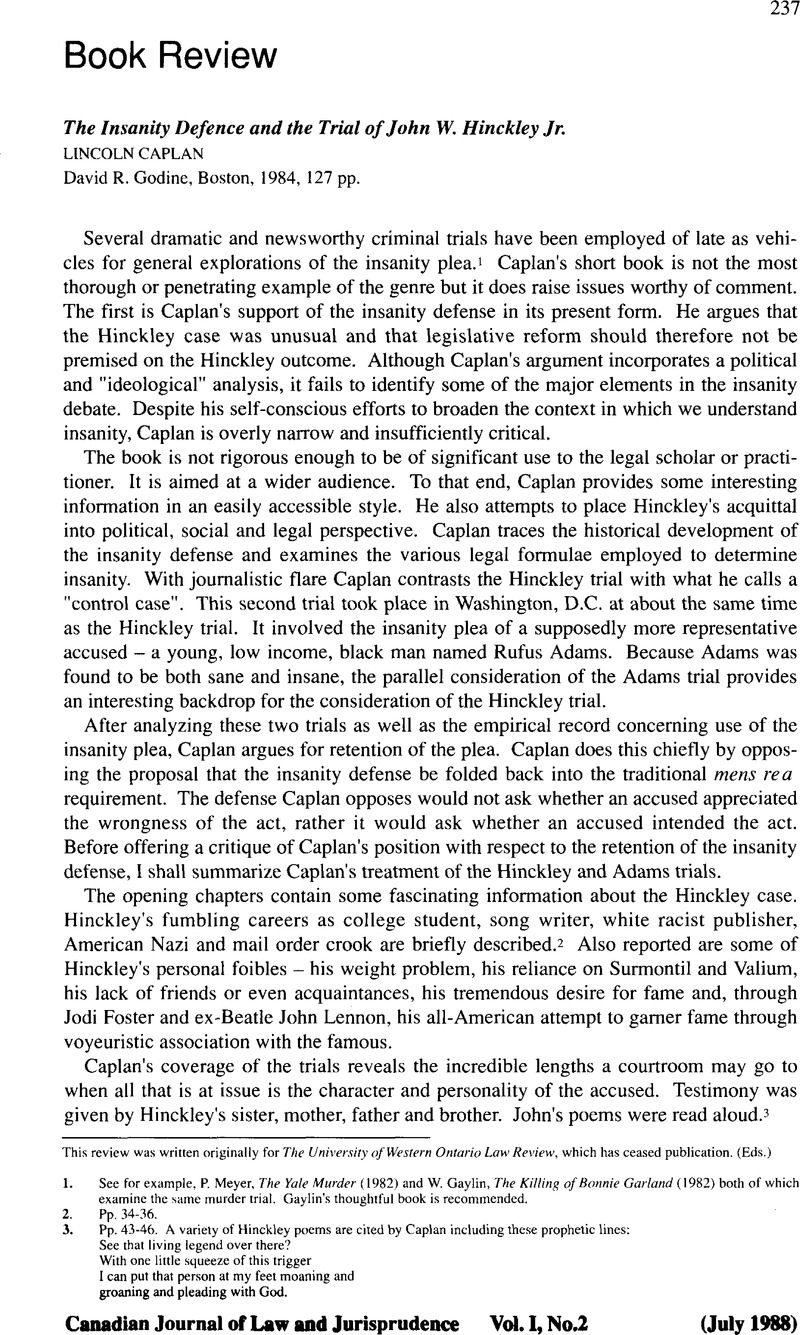No CrossRef data available.
Article contents
The Insanity Defence and the Trial of John W. HinckleyJr. LINCOLN CAPLAN David R. Godine Boston, 1984, 127 pp.
Published online by Cambridge University Press: 09 June 2015
Abstract

- Type
- Book Review
- Information
- Copyright
- Copyright © Canadian Journal of Law and Jurisprudence 1988
References
This review was written originally for The University of Western Ontario Law Review, which has ceased publication. (Eds.)
1. See for example,Meyer, P. The Yale Murder(1982)Google Scholar and Gaylin, W. The Killing of Bonnie Garland(1982)both of which examine the same murder trial. Gaylin’s thoughtful book is recommended.Google Scholar
2. Pp.34-36.
3. Pp. 43-46. A variety of Hinckley poems are cited by Caplan including these prophetic lines:
See that living legend over there?
With one little squeeze of this trigger
I can put that person at my feet moaning and
groaning and pleading with God.
4. Pp. 88.
5. Pp. 43.
6. Pp. 59.
7. Pp. 60.
8. Pp. 55.
9. The term “The Yale Murder”is used in the Morsian sense.Google ScholarPubMed See,Morse, S. “Crazy Behaviour, Morals and Science: An Analysis of Mental Health Law” (1978),51 Calif, L.Rev.527.Google Scholar
10. Pp. 56.
11. Pp. 93.
12. Pp. 94.
13. Pp. 104.
14. Caesar, “The Insanity Defense: The New Loophole” (1979),25 Cr. & Delinq.436.CrossRefGoogle Scholar
15. Under the law of retentionist states such as Texas, Florida or Georgia, the death sentence would havebeen a definite possibility in both cases.See,Carrington, F. Carrington, Neither Cruel Nor Unusual (1978).Google Scholar
16. Pp.111
17. Actually, the source of disturbance rather than its severity seems to be the major criterion relied upon by opponents of the mens rea test. That is, they want to excuse offenders who intended their actsbut were mentally ill, whereas they will punish those in the same category who were merely drugged orin a jealous rage. Caplan and others worry that the mens rea test will not take adequate account of the incapacitating effect of severe mental illness’ but the scientific evidence for their assumption of incapacitation is quite weak.See,for example,Fingarette, H. & Hasse, A. Mental Disabilities and Criminal Responsibility (1979).Google Scholar
18. Pp. 109.
19. Pp. 54, 68.
20. Pp.116.
21. See, for example,Rachman, S. &Wilson, G. The Effects of Psychological Therapy(1980);Google Scholar Eysenck, H.J. The Effects of Psychotherapy (1969);Google ScholarPubMed Gross, M. The Psychological Society (1978);Google Scholar Zilbergeld, B. The Shrinking of America (1983).Google Scholar
22. See, for example,Szasz, T. Psychiatric Justice(1965);Google Scholar Torrey, E.F. The Death of Psychiatry (1975);Google Scholar Ennis, B. Prisoners of Psychiatry (1972);Google Scholar Halleck, “A Critique of Current Psychiatric Rolesin the Legal Process” (1966), Wise. L. Rev.379.Google Scholar
23. This issue is discussed in detail in Mitchell, “Culpable Mental Disorder and Criminal Liability”(1985),9 Int’Law&Psych.Google ScholarPubMed
24. Pp. 80-81.
25. Pp. 70. The defense experts found Hinckley to be mentally ill. He had a “narcisstic personality disorder”. This was manifestin a ‘grandiose sense of self-importance...; preoccupation with fantasies of unlimited success and ideal love; the search for constant attention’. The banality of Hinckley's “condition” - chronic boredom, “resistance to parental demands”, and “overreaction to minor events”- was well captured by news reporters who dubbed it “dementia suburbia”.The commonplace nature of these symptoms, however, do not reflect on the issue of causality. Was Hinckley in large part a victim of his own overindulgence in feelings of success and self-importance, or did his symptoms just "happen to him"through no fault of his own?
26. Pp. 126.
27. Pp. 127
28. Szasz, T. The Therapeutic State(1984).Google ScholarPubMed
29. Representative examples of the therapeutic ideology are found inMenninger, K. The Crime Of Punishment(1966);Google Scholar Abrahamsen, D. The Psychology OfCrime (1960).Google Scholar
30. Pp. 75.
31. Pp.79.




